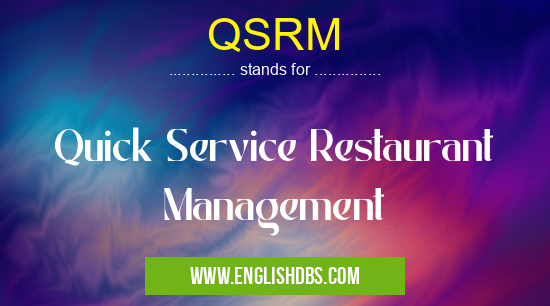What does QSRM mean in MANAGEMENT
QSRM stands for Quick Service Restaurant Management. It refers to the management principles and practices specific to the fast-paced and high-volume environment of quick service restaurants (QSRs). QSRs are often characterized by limited table service, a focus on speed and efficiency, and a menu of standardized and affordable food items.

QSRM meaning in Management in Business
QSRM mostly used in an acronym Management in Category Business that means Quick Service Restaurant Management
Shorthand: QSRM,
Full Form: Quick Service Restaurant Management
For more information of "Quick Service Restaurant Management", see the section below.
» Business » Management
Meaning of QSRM in BUSINESS
QSRM involves managing various aspects of QSR operations, including:
- Menu planning and development
- Food preparation and inventory management
- Order taking and processing
- Customer service and satisfaction
- Staff training and supervision
- Financial management and profitability analysis
Essential Questions and Answers on Quick Service Restaurant Management in "BUSINESS»MANAGEMENT"
What is Quick Service Restaurant Management (QSRM)?
QSRM is a specialized field of hospitality management that focuses on the operations and management of fast-paced, high-volume restaurants. It involves overseeing all aspects of the restaurant's daily operations, including food preparation, customer service, and staff management.
What are the key responsibilities of a QSRM manager?
QSRM managers are responsible for a wide range of duties, including:
- Planning and managing daily operations
- Hiring, training, and managing staff
- Ensuring food safety and quality
- Maintaining a clean and sanitary environment
- Monitoring sales and revenue
- Developing and implementing marketing strategies
- Complying with all applicable laws and regulations
What are the essential skills for a successful QSRM manager?
Successful QSRM managers typically possess a combination of hard and soft skills, including:
- Strong leadership and management abilities
- Excellent communication and interpersonal skills
- Knowledge of food safety and sanitation practices
- Experience in managing high-volume operations
- Proficient in using technology and software for restaurant management
What are the benefits of using a QSRM software system?
QSRM software systems can provide significant benefits for restaurant managers, including:
- Streamlining operations and improving efficiency
- Automating tasks and reducing labor costs
- Enhancing customer satisfaction and loyalty
- Providing valuable data and insights for decision-making
- Complying with industry regulations and standards
How can I improve my QSRM skills and knowledge?
There are several ways to enhance your QSRM skills and knowledge, such as:
- Pursuing a degree or certification in hospitality management
- Attending industry conferences and workshops
- Reading industry publications and articles
- Seeking mentorship from experienced QSRM managers
- Staying abreast of the latest trends and technologies in the industry
Final Words: Effective QSRM is crucial for the success of any QSR business. By implementing efficient management practices, QSRs can improve their operational efficiency, enhance customer satisfaction, and maximize profitability.
